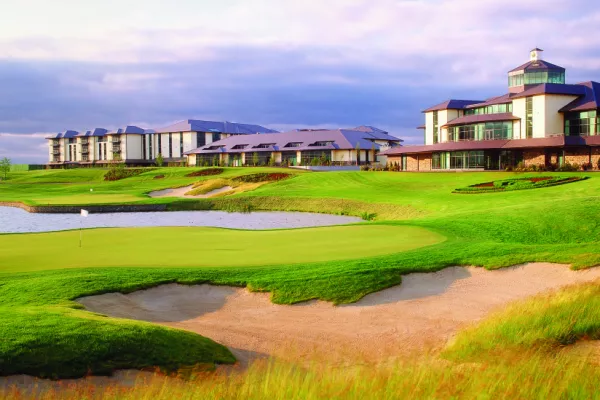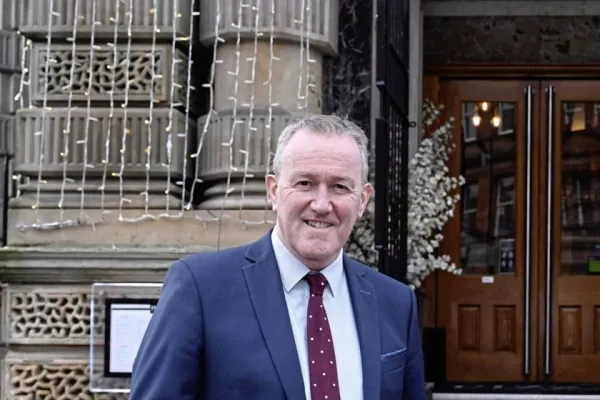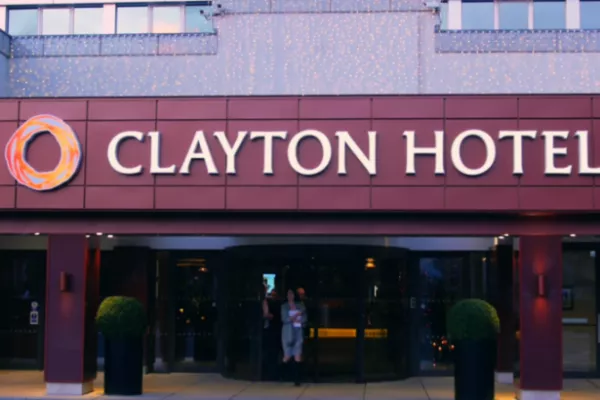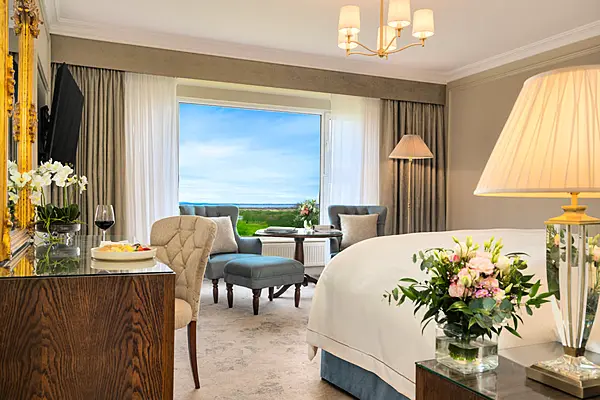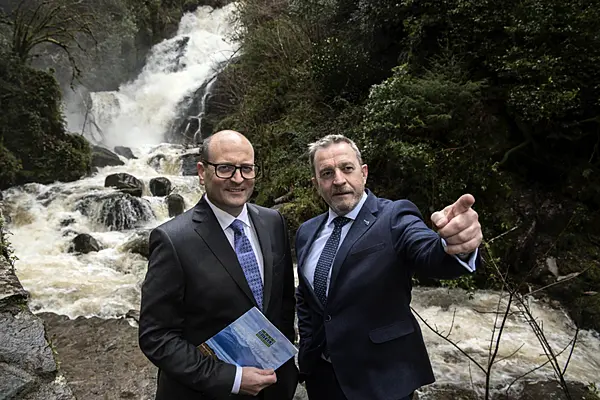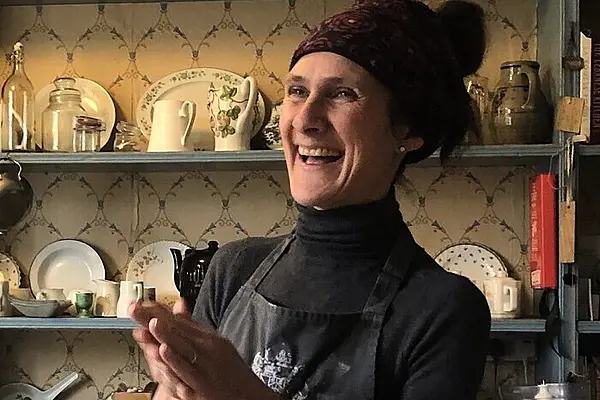When The Heritage Killenard came up for sale last March, with an asking price of €5.5 million, many of the usual suspects were interested, but the new owners took everyone by surprise: an American litigation lawyer and legendary-within-his-industry computer-games designer. Emily Hourican spoke to Robert Wright about leaving the law for hotels, and why Ireland is the place he wants to be.
The new owners of The Heritage Killenard – a five-star property in Laois built just over ten years ago by the Keane family (at a reported total cost of some €100 million) and put into receivership in 2010 – are rather unexpected.
The hotel was put up for sale in March 2014, with a guide price of €5.5 million. Instead of being snapped up by an existing hotel group, or even an Irish businessman, the hotel has been bought by two Americans with no experience of running hotels. One is a former trial lawyer, the other a computer-games designer, co- creator of the groundbreaking shooter games Doom and Quake.
Robert Wright may be an unexpected hotelier, but I suspect that he was also a somewhat unexpected litigation lawyer. Born in Japan, where his parents were Christian missionaries, Wright lived there for 18 years, with the odd furlong back to the States. He then moved to Texas for university, followed by three years of law school, and has been back to Japan just once since he left.
“It’s strange when you’re back in your homeland and you’re perceived as a foreigner,” Wright says, of the experience of returning to a land that he didn’t know, which was nonetheless home. However, he sees strong parallels between Japanese and Irish culture in at least one, pertinent, regard. “Hospitality is a founding part of these two very diverse cultures. I grew up in a culture that values and recognises hospitality, and I'm now living in a culture where that is also true."
Of his early career, Wright says, "I've always been a talker, but I'm actually very shy by nature, even introverted, but I began to find out that I could speak OK and was relatively conversant – some people might even say articulate – and the shyness went away and the extroverted people person came out. I had to learn how to walk into a courtroom, look at 40 people I had never met before, and talk to them for an hour and pick out the ones who would not see things the way my client saw them, and identify the ones who would be sympathetic to my client’s position, in order to make up a jury. That’s a people skill – an ability to read body language, to analyse. The secret for me was not to just get up and introduce my client. Instead, I would also introduce myself and my family. I would give them a three-minute spiel on my life, what was going on, the things that were important in my life. It’s by exposing yourself, being vulnerable, that you make the connection.”
So how exactly does a Texas trial lawyer end up in Laois, owner of a 98-bedroom hotel built at the height of the Celtic Tiger? He doesn’t even have Irish roots.
“My people left Scotland, got on a ship trying to get to Ireland, and a storm came up and they washed ashore in South Carolina,” he laughs, “but I’ve been coming to Ireland for 20 years as a tourist. I’ve always loved it. I’ve been fortunate in my life to travel everywhere I wanted to go, except New Zealand, and Ireland is one of the places I liked the most. I came to play links golf at first, and we came back at least once a year, from 1995 onwards. The first time I came to Ireland, I brought my mom, my wife and my daughter, who was then 15, for four days, and flew out on St Patrick’s Day. That’s probably sacrilege!”
It’s a story of various parts, each of them carefully managed by Wright. “I spent 25 years practising as partner, and, ultimately, senior partner, in what we call Big Law, law firms with over 1,000 attorneys. I worked my way up. I was lucky, and, ultimately, had some success. Along the way, I took a sabbatical for two years and went into business. I bought an oil-field service company, and I took that company from $500,000 in sales to $5 million in sales, and then I sold it at the right time.
“I decided I wanted to be a lawyer, not a businessman, because the intellectual challenge is so significant, but I also knew I wanted to retire from law at 60. That was always my plan. When I turned 50, I walked away. I rented a 100-year-old house that had been converted into offices, five minutes from my house in Fort Worth, Texas. I hung out a shingle, and I became a country lawyer. I left all my clients behind, all the big corporations, and then I started representing individuals.”
At this point, I say, it seems to me that Harrison Ford is playing him in the story of his life – the honourable, small-town lawyer read body language, to analyse. The secret for me was not to just get up and introduce my client. Instead, I would also introduce myself and my family. I would give them a three-minute spiel on my life, what was going on, the things that were important in my life. It’s by exposing yourself, being vulnerable, that you make the connection.”
So how exactly does a Texas trial lawyer end up in Laois, owner of a 98-bedroom hotel built at the height of the Celtic Tiger? He doesn’t even have Irish roots.
“My people left Scotland, got on a ship trying to get to Ireland, and a storm came up and they washed ashore in South Carolina,” he laughs, “but I’ve been coming to Ireland for 20 years as a tourist. I’ve always loved it. I’ve been fortunate in my life to travel everywhere I wanted to go, except New Zealand, and Ireland is one of the places I liked the most. I came to play links golf at first, and we came back at least once a year, from 1995 onwards. The first time I came to Ireland, I brought my mom, my wife and my daughter, who was then 15, for four days, and flew out on St Patrick’s Day. That’s probably sacrilege!”
It’s a story of various parts, each of them carefully managed by Wright. “I spent 25 years practising as partner, and, ultimately, senior partner, in what we call Big Law, law firms with over 1,000 attorneys. I worked my way up. I was lucky, and, ultimately, had some success. Along the way, I took a sabbatical for two years and went into business. I bought an oil-field service company, and I took that company from $500,000 in sales to $5 million in sales, and then I sold it at the right time.
“I decided I wanted to be a lawyer, not a businessman, because the intellectual challenge is so significant, but I also knew I wanted to retire from law at 60. That was always my plan. When I turned 50, I walked away. I rented a 100-year-old house that had been converted into offices, five minutes from my house in Fort Worth, Texas. I hung out a shingle, and I became a country lawyer. I left all my clients behind, all the big corporations, and then I started representing individuals.”
At this point, I say, it seems to me that Harrison Ford is playing him in the story of his life – the honourable, small-town lawyer with a passion for people and justice, and sure enough, “My goal was to be successful enough at that to be able to represent anyone who walked into my office for free – a completely pro-bono practice. And with God’s blessing, I got there. So at age 60, I still knew I wanted to retire from law, so I shut the practice down, and then I didn’t know what I wanted to do.”
This is the moment when fate lent a hand. Wright’s son was by then finishing an MBA and required to write a paper on “an industry of his choosing. For some reason,” says Wright, “he chose the hotel industry in Ireland, and business opportunities with hotels coming out of receivership. I read his paper, and I said, ‘Wow.’ So I got in touch with Savills, with CBRE, and I started looking. My plan was to buy a hotel in Ireland and retire as the owner.”
“I walked in, and I liked it.”
First, Wright invited a friend on the journey with him. Adrian Carmack is unknown to most of the population, but a legend within the gaming community. An art student who turned to computers, he set up Id Software with John Carmack (totally unrelated), and together they revolutionised computer games with first-person shooter perspectives and the kind of artwork that is still being copied – Wright describes Adrian Carmack as “the Picasso of the computer-game world”. Together they created Doom and Quake, two seminal games, before parting company in a manner that required the intervention of lawyers.
“Adrian was a multimillionaire before he was 25 years old, from a company he started in his garage. It’s the American way,” says Wright, with satisfaction. “He was ready to retire by the time he was 35. I got to know him because he had to have some litigation to get what he was entitled to when he retired from the company.” This seems to me a very gracious, Southern- style way of describing what was a fairly famous lawsuit, over the enforceability of a contract. “He was very happy with the outcome of that, and I made a friend.”
So this was the friend he turned to with his idea for an Irish hotel. Adrian was interested. “He has Irish roots – he’s a lot closer to them than I am to mine – and I asked him, ‘Do you want to get on this journey with me?’ He was all in, but doesn’t want to be involved in the day-to- day. He’s an artist and a true introvert.”
Wright looked at “25 hotels. I was in Sligo, at the Ice House, and I opened up the property section of The Irish Times and I saw that the Heritage Hotel just went on the market. The next morning, I drove to Laois. I walked in, and I liked it.”
Really, that was that, although, of course, the formalities took a little longer.
“I had already established a relationship with Tifco. They did a site visit and reported back. I talked to Adrian, and, sight unseen, he said OK, even though it was quite a bit bigger than what we had been considering. We negotiated with the receiver, and last September, we took over.”
Then, of course, the fun started. “I was owner in residence. Adrian would come over every six weeks or so. I was learning the business along the way. There was a lot of meet-and-greet, of drilling down into what’s involved in running hotels. I had no experience, although I’ve stayed in all kinds of hotels – I’ve clocked up over six million miles of air travel over the years – but it’s another thing entirely to get behind the scenes, to see what goes on in the kitchen, the back office.”
“I want to be part of that.”
Wright made the general-manger position redundant, which means, he says with a laugh, “Now it’s me. I’m very confident about my ability to manage. Some of the things we’ve done – we’ve rebranded ourselves as The Heritage Killenard. We’ve made substantial capital investment – like every other hotel in Ireland, for five years, there wasn’t much of that – and our building is ten years old, so it was time to refurbish. We’ve built an outdoor playground, and we have a great children’s programme. They are totally looked after from 9.30 to 5pm. In the evening, they have a movie in our 50-seat cinema, with popcorn, and once a week, we have a disco, but the thing that I’m the proudest of is the investment in people.”
It’s clear that in his years of law, Wright has learned not just to read people, but also to value them. “We’ve got a beautiful property, but a hotel is only as good as the staff, the people who work there. We have invested substantially in training. Revenue is up, average room rate is up, occupancy is up – this is because of what we’re doing, to a degree, but it is also because the economy is up. I can’t take credit for that, but I can take credit for the staff, and the training that has gone into them. We chose front- line staff who we thought were talented, and put them on a Train the Trainer programme. We have 15 minutes’ training every day in every department, and we’ve run through three cycles of Train the Trainer. We have quarterly head-of- department off-site days. The staff had never done this before, and some have been here ten years now.”
The hotel staff have jumped from 120 to 172 employees. “We’ve created 52 new jobs, and the service level for our guests has gone up. Guests who have been coming for years, who haven’t been here since the ownership change, really notice the difference. Staff are happy and smiling service is really good. We still have work to do,” Wright admits, adding cheerfully, “we’re always going to have work to do. If we get a complaint – and it can happen – we analyse it. We don’t try to scapegoat or witch-hunt. We identify where the breakdown was, and ask, ‘What’s wrong with the process? Do we need more training? Do we need to change our standard operating procedure?’ and we act accordingly. I empower the managers to deal with problems and not to pass the buck. They take on the responsibility. With that comes accountability, and, please God, at the end of the year, reward.”
Behind the day-to-day changes, there is a philosophy at work here. “Any organisation takes on the character of its leader,” Wright says. “I take that very seriously. Our core corporate values are: number one, integrity – be honest in our dealings with each other, our guests, suppliers, competitors, the government; number two, transparency – we are going to be open and honest, with no hidden agendas; number three, communication – before we came on board, the departments didn’t talk to each other, they were all competing with each other; if they could take a problem and dump it on another department, that’s what they did – and number four, cooperation. It’s all about the guest at the end of the day. We all have to jump in and back each other up and communicate with each other.”
Wright is, he says, “a baby hotelier”. So will he grow up and acquire more property? “I won’t,” he says. “This is my baby. I met Bill Kelly recently. He gave me a day of his time. Now, I would never think I could be what he is – he’s fourth generation – but he’s sort of my idol. The way he runs his operation is what I’d like to do.” And so Wright is in the curious position of being “fully retired and fully employed”, but has no desire to build a hotel empire here.
So what is his assessment of the economic climate he has bought into? “I think we’re going to be fine. I’d like to see the euro get stronger, although it’s good for tourism from the UK and the States. However, our main market is Dublin. It’s under an hour to get here. What I’m seeing here is the strongest economy in Europe. It’s a good time to be here – consumer confidence is up, tourism is up. There are cycles in economies and business. You can’t know what’s going to happen, but there will always be boom and bust. Texas is an oil state, so it is in a constant cycle of boom and bust. You see these bumper stickers that say, ‘Dear God, send me one more boom and I promise I won’t screw it up,’” he laughs, “but I think we’re into a good cycle here now.”
Sometimes, Wright reckons, “It takes an outsider to see the good things. I am a very optimistic person, although I’m not a Pollyanna, and I can see this is a great place to be. I feel very, very safe here. Our social fabric in America is torn. Here, people are not walking into churches and cathedrals and shooting people.”
Currently, Wright travels back to Texas for three or four days a month, but Ireland is his main interest. “The reason I want to live here, the reason I want to get citizenship as soon as possible, the reason I’m going to die here in Ireland and be buried here is because when things got tough, when austerity came, what did the Irish people do? You tightened your belts, you put the shoulder to the wheel, and you kept on going. I want to be part of that.”
